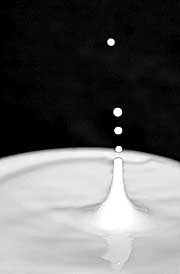| Home A B C D E F G H I J K L M N O P Q R S T U V W X Y Z |
|
Home |
Calcium and Bone Health
Calcium is one of the most important of all minerals, and perhaps the one that has the most direct impact on our good health. Everyone knows that calcium is vital to growing strong bones and teeth, and dieters should not be frightened of the calories in milk, cheese and other dairy products. Drinking plenty of milk and eating plenty of other calcium rich foods is vital to good health. While calcium supplements can certainly help, the foundation of daily calcium intake should be a healthy and balanced diet. Dietary Sources of Calcium: Every dieter knows that milk is the best source of calcium, but there are some other calcium rich foods that may surprise you. In addition to butter, ice cream, cheese and other dairy products, high levels of calcium are also found in beans, fruits, nuts and even seafood. Recommended Daily Intake of Calcium: The recommended daily intake of calcium is 1000-1200mg depending on age and gender. In general, women need more calcium than men. Calcium as Supplements: Most calcium supplements range between 500mg and 1000mg. Calcium is often combined with vitamin A and vitamin D for maximum benefit. Side Effects and Toxicity of Calcium: People should avoid taking more than 2.5 grams per day of calcium, as calcium at that level can interfere with the absorption of many other minerals, most notably iron and zinc. Excess consumption of calcium may also be associated with excess risk of kidney stones. Symptoms of Deficiency of Calcium: Unfortunately, thinning bones and the onset of osteoporosis are often the first signs of a calcium deficiency. Other symptoms can include irregular heartbeat, joint problems, nervousness and insomnia.
|
||
|
|
||
|
Glossary References Links Contact
|